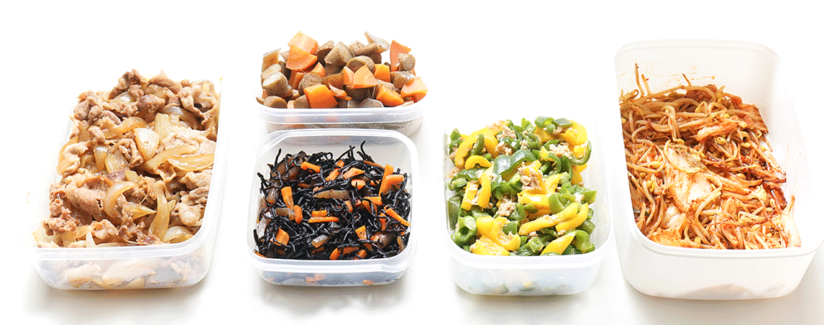
Ready to Try Meal Prepping? Some Tips to Get Started
Meal prepping is one way to help you stay on track with healthy eating. It also helps save time and energy in the kitchen throughout the week. While prepping a week’s worth of meals might sound intimidating, it can save time, money and energy in the long run.
Toby Amidor, MS, RD nutrition expert, and author of best-selling The Healthy Meal Prep Cookbook: Easy and Wholesome Meals To Cook, Prep, Grab, and Go finds value in meal prepping and gave us some pointers on how to make meal prepping safe, healthy and long-lasting.
What exactly is meal prepping? Amidor says that it is when you plan and cook your meals for the week by preparing larger meals and either separate or freeze them. She suggests prepping over the weekend, cooking double batches and freezing some meals, too.
“As a working, single mother of 3 children I love meal prepping,” Amidor said. “On Sundays, I will use my slow cooker to make a chili or stew, and then I will have it for the rest of the week. I’m one of those people that like to meal prep twice a week. This is because my kids have a lot of activities over the weekend. Once the activities calm down, I go back to meal prepping once a week.”
She outlined the many benefits of meal prep:
- Saving money: If you know what you’re going to cook, you can purchase accordingly. You can also purchase foods in bulk and divide it into portions to use at a later time.
- Saving time: Although you will spend some time in the kitchen on a set day of your choosing, during the week you won’t be slaving over a hot stove and can actually save about 45 minutes during a busy work week.
- Portion control: When you meal prep for the week, you can divide the meal into individual portions to grab-and-go during the week. This is an easy way to keep calories and portions in check.
- Getting more done with less effort: It takes less effort to prepare a double batch of chili or muffins then to cook them twice. When you cook a double batch, you can freeze half for a later date.
- Eating healthier: Instead of hitting the nearest bodega or fast food joint, your meals will be well planned and prepared in advance so you don’t fall victim to hunger and choose the closest food available to eat.
The good news about meal prepping is that once you have prepared the meal, it will last a while. Amidor says that you can typically store food in the refrigerator for up to five days, but there are still some rules surrounding that. Fish, for instance, only lasts up to three days. And, as a good rule of thumb, if it looks or smells funny, discard it.
However, can too much of a good thing be a bad thing? We had some hesitations surrounding the issue of food safety. So, we wanted to know a little bit more about how to safely store the food that we are prepping.
“Once you divide the food into smaller containers, make sure to cover and keep refrigerated (or frozen),” said Amidor. “Refrigerated food can last about five days.”
When choosing containers, Amidor suggests keeping the following in mind:
- Leak-proof containers: especially if you plan on taking the container on-the-go.
- Microwave, dishwasher and freezer safe.
- Stackable and nestable: containers can take up a lot of room in the fridge and freezer, so you want them to fit nicely wherever you place them.
Are you worried about having a busy week and not getting through all your food? You can always freeze them until you are ready to use them, but there are certain food items that freeze better than others.
“Foods that freeze well include those with sauces or a liquid base like chili, soups, chicken parm, meatballs in tomato sauce,” said Amidor. “Baked goods like muffins, pancakes, and waffles also freeze well. Protein foods like chicken, beef, turkey, and fish also are perfect to freeze for later. Freezing isn’t the main cause of loss of nutrients. Vitamins are easily destroyed when heated, exposed to air, light, and cut into smaller pieces. You can minimize nutrient losses by using quick cooking methods like stir-frying or steaming, cutting fruit or vegetables into larger chunks, and covering foods before placing them in the fridge or freezer.”
Most foods can last in the freezer for two months. Be sure to label the food you have in there so you know what’s still good to eat, and what isn’t.
If you have decided to meal prep, some tips to keep in mind
- Check your calendar and calculate how much you’ll have to cook.
- Make a menu, and stick to it!
- Start small and simple.
- Pick recipes that you’ll like.
- Go food shopping with a list!
- Prep and pack your food ahead of time.
Everyone has their go-to recipes, some of us love potato soup, chili or tacos. We asked what Amidor what her favorites included.
“During the winter I love warming soups,” said Amidor. “Here is one of my favorites that I meal prep. It is from my best-selling cookbook The Healthy Meal Prep Cookbook. Other recipes from my cookbook that I love to meal prep include homemade Trail Mix, Tart Cherry-Almond Breakfast Cookies, Slow Cooker White Chicken Chili, Apricot Chicken Drumsticks.


























